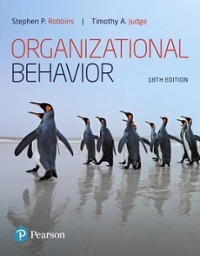Dr. Judith Sills, in an article in Psychology Today, recalls the story of an organizational consultant who
Question:
Dr. Judith Sills, in an article in Psychology Today, recalls the story of an organizational consultant who visited a large engineering firm. He found that all the employees had something extra following their name on their plastic nametags: their Myers-Briggs personality type (e.g., INFJ, ESTP, etc.). Dr. Sills found that this highlighted an important truth in the workplace: Even after all we do, say, hear, and think, we still must interact with one another.
Sometimes these interactions can lead to conflict; of the causes of this conflict, personality clashes are the third most common, a recent survey from XpertHR suggests. For example, Tim Ursiny, an organizational psychologist and founder of Advantage Coaching, was hired by Wells Fargo to help manage some of these personality clashes that had arisen within their ranks. He suggests that many personality differences result from clashes between trait dimensions such as outspoken and reserved, impulsive and methodical, along with skeptical and accepting. It is easy to see how these dichotomies can, at least to some degree, map onto facets of the Big Five, like extraversion, conscientiousness, and agreeableness. Of these types, the more dominant, impulsive types tend to foster more conflict than the others.
Some research supports the impact of personality within teams because certain personality characteristics seem to affect whether the interpersonal conflict helps or hurts team performance. For example, when the team is composed of employees high on openness to experience and emotional stability, conflict can help their performance. However, when the team is low on these qualities, conflict can hurt performance. Additional research has explored how personality differences affect employees’ relationships with their supervisors. Employees and supervisors report weaker relationships between one another when they differ on emotional stability, openness to experience, agreeableness, and conscientiousness (but not extraversion).
Questions
1. Have you ever had an experience in which your personality clashed with someone, either at work or outside work? What did you do to resolve it? Was the situation resolved?
2. Which do you think is more important: similarity between personality types or differences? Explain your answer.
3. Do you think knowledge of personality similarities or differences can help employees reduce conflict and get along better? Or does this knowledge have the potential to cause harm? Explain your answer.
Step by Step Answer:

Organizational Behavior
ISBN: 9780134729329
18th Edition
Authors: Stephen RobbinsTimothy JudgeTimothy Judge, Timothy Judge





